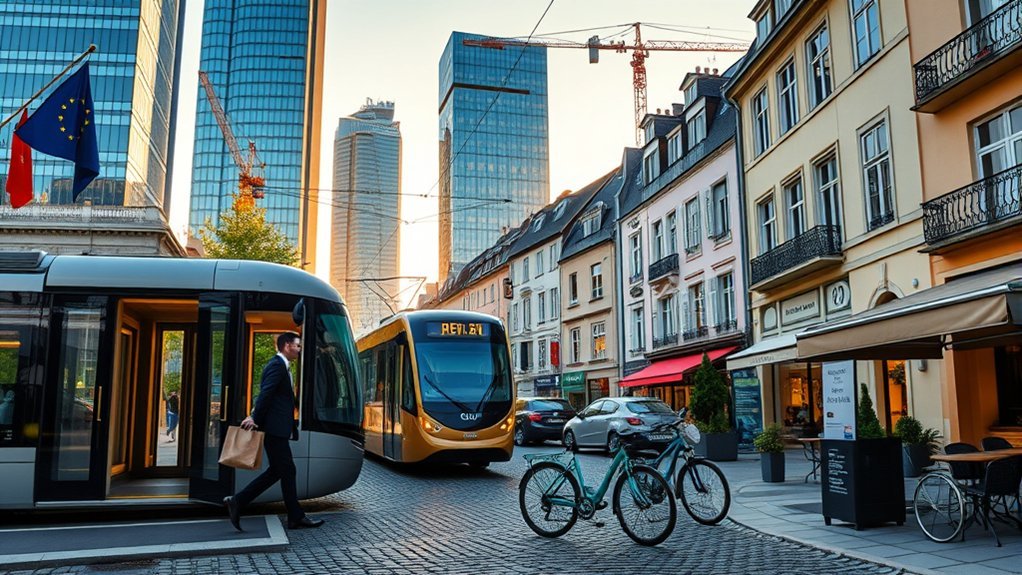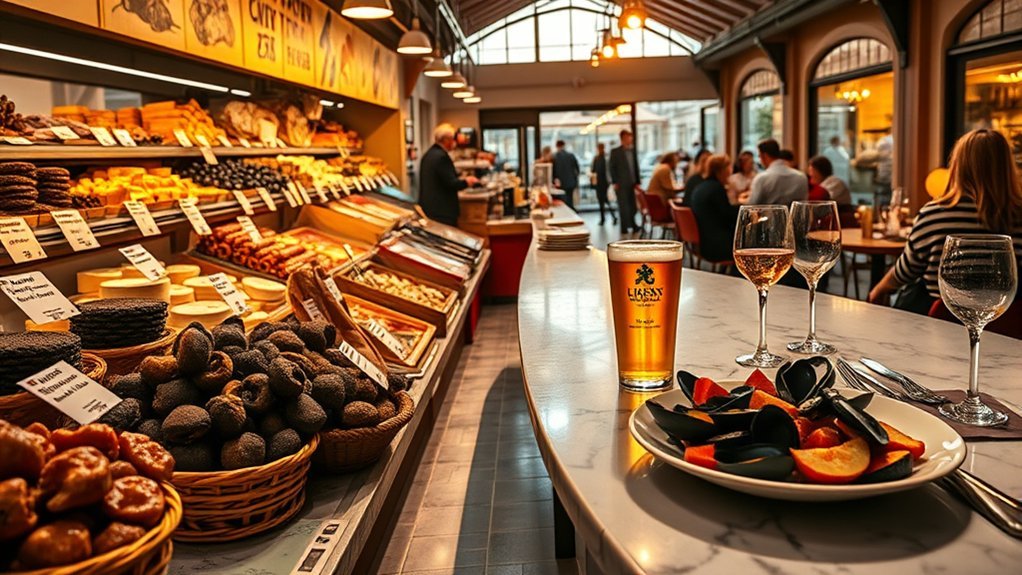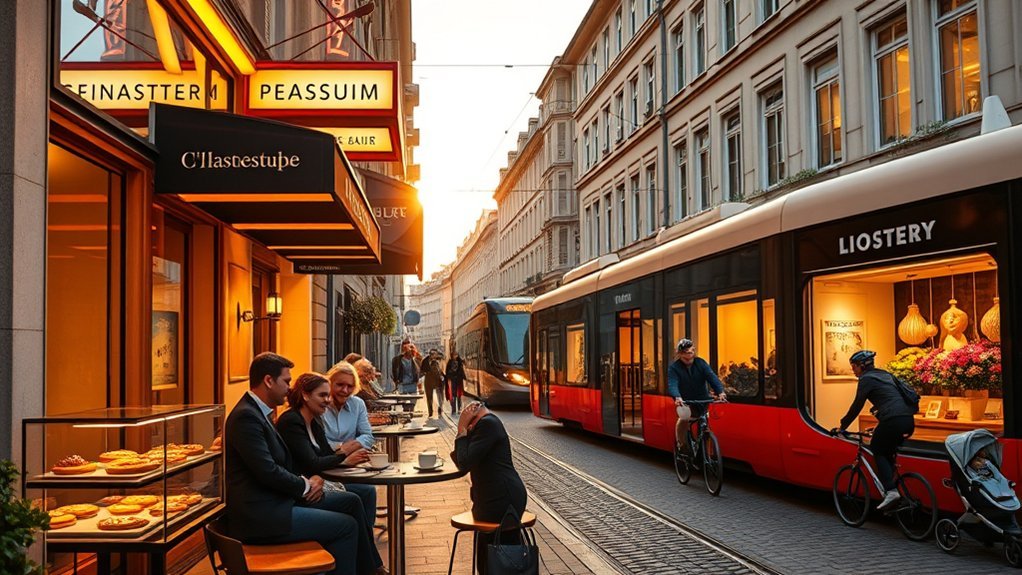You’ll need a comfortable budget in Luxembourg: expect average gross pay around €5,144, minimum wages from €2,571 to €3,085, and typical city-center one‑bed rent near €1,870. Monthly living costs vary — roughly €1,200 for a single (excluding rent) and €4,340 for a family of four — with utilities, groceries, transport and health insurance adding up. Public transport is free, which helps, and the following sections break down housing, bills and savings ideas.
Overview of Luxembourg’s Economy and Wages

Although Luxembourg is small, its economy punches well above its weight: with a 2023 GDP per capita of €119,984 and projections placing it as the richest country by 2024, incomes and living standards are among the highest in Europe.
Although small, Luxembourg packs economic punch: 2023 GDP per capita €119,984, ranking it among Europe’s wealthiest.
You’ll notice that strong GDP per capita translates into real purchasing power: equivalised disposable income is €47,636 per person, well above the EU average, which supports a high standard of living.
On wages, the average gross salary sits around €5,144 monthly, yielding about €4,455 net after taxes, so you can roughly gauge take-home pay. Minimum wage levels are also comparatively high — €2,570.94 for unskilled and €3,085.11 for skilled workers in 2024 — which cushions low-earners against cost pressures.
Inflation is modestly easing, projected near 2.3% in 2025, so while purchasing power may dip slightly, the overall fiscal and wage environment keeps living standards robust and predictable.
Monthly Budget Breakdown for Singles and Families

You’ll want to compare basic monthly expenses — groceries, utilities (~€230), and healthcare — against housing costs to see real affordability.
For a single person, expect about €1,238 monthly (excluding rent) plus average city-center rent (~€1,866), while a family faces roughly €4,342 (excluding rent) and total monthly outlays around €5,661 once housing is included.
Factor in free public transport, potential private school fees (€14,750–€22,500/year), and you can estimate realistic savings and disposable income.
Basic Monthly Expenses
When you break down monthly living costs in Luxembourg, expect substantially higher non-rent expenses for families than for singles: a single person typically spends about €1,238 a month (excluding rent), while a family of four averages roughly €4,341.90.
Use these figures to benchmark the average cost of living and plan monthly expenses. Groceries take about 10% of budgets; a household may spend roughly €567 monthly.
Public transport is free for residents, cutting commuting costs that once averaged €36. Though average rent for a city-center one-bedroom is about €1,866, this section excludes housing specifics.
Housing and Rent
Now that you’ve benchmarked non-rent monthly expenses, housing will likely be the single largest line item to address in your budget.
Expect housing costs well above the EU average: average rent in Luxembourg hits about €28.79/m². If you’re single, a one-bedroom in the city center averages €1,873 monthly, or €1,560 outside center.
For a family of four, a three-bedroom costs roughly €3,700 in center and €2,520.45 outside.
Newcomers often rent first to test neighbourhoods because buying requires a larger capital outlay amid rising prices.
When you model monthly expenses, treat rent as fixed and non-negotiable initially, then adjust discretionary spending. This gives a realistic picture of affordability before considering home purchase or savings.
Savings and Disposable Income
Although Luxembourgers earn relatively high wages, you still need to plan carefully to turn gross pay into meaningful savings, because housing and everyday costs quickly eat into monthly income.
Look at numbers: the average monthly net salary is about €4,454.66, and typical living expenses (excluding rent) run €1,238 for a single and €4,341.90 for a family of four.
Add rent—€1,866 for a city one-bedroom or €2,520.45 for a three-bedroom outside center—and your disposable income shrinks fast.
With average monthly household expenses projected at €5,661 in 2025, prioritize a budget: allocate essentials, cap discretionary spending, and automate savings.
Monitor rising costs and adjust contributions so savings keep pace with living expenses.
Housing and Rental Prices by Area

Because Luxembourg’s housing market varies markedly by location, you’ll find rents and purchase prices climb steeply toward the city center and fall as you move north.
Luxembourg’s housing costs rise sharply toward the city center and drop noticeably as you head north.
You’ll see housing and rental prices in Luxembourg City reflect high demand: studio rents typically run €1,000–€1,500, a one-bedroom averages about €1,873 in the center versus €1,560 outside, and a three-bedroom can reach €3,700 centrally compared with €2,520.45 beyond.
On a per-square-meter basis, the central region averages €32.33/month for rentals, while the northern region averages €18.38.
Purchase costs amplify this gap: the national average purchase price in December 2024 was €8,261/m², but you’ll pay substantially more in central neighborhoods and much less up north.
When planning your budget, use these averages to estimate trade-offs between commuting time and living space, and prioritize location versus square meters to match costs with lifestyle and work needs.
Utilities, Internet and Household Expenses

Expect monthly utilities for an 85 m² apartment to run about €230, with electricity near €0.15/kWh meaning bills can rise in winter.
Internet and mobile plans are relatively pricey too — expect around €162/month for fiber and additional costs for mobile data or premium packages.
Factor grocery variance and household extras into your budget, using discount chains like Aldi or Lidl to keep food costs down while public transport cuts commuting expenses.
Monthly Utility Bills
When you budget for monthly utilities in Luxembourg, plan on roughly €230 for basic services in an 85 m² apartment (electricity, heating, water, garbage).
These monthly utility bills reflect electricity near €0.15/kWh, higher than the EU average, so your heating and power use will drive costs. For planning, treat €230 as a baseline and add variability for colder months or energy-intensive appliances.
Estimated monthly costs should also account for occasional waste or water rate changes.
Separately, average monthly communication costs are about €162, but you’ll cover internet and mobile in the next section; note here that communication adds materially to household spending.
Use these average prices to model scenarios and stress-test your monthly budget.
Internet and Mobile Costs
Having covered basic utilities, it’s also important to factor in communication costs: broadband and mobile plans can add materially to your monthly bills.
In Luxembourg, internet and mobile costs contribute significantly to household spending: the average monthly communication costs are around €162. You can cut that substantially if you choose a budget fiber broadband connection, which can start at roughly €5 per month, leaving mobile as the larger share.
If you prefer pay-as-you-go, a prepaid mobile tariff typically charges about €0.13 per minute, offering flexible, low-commitment calling.
When planning your monthly budget, compare bundled offers versus separate services, check contract lengths and data caps, and prioritize speeds and coverage to match your actual usage and avoid unexpected extras.
Household Supplies & Extras
A clear breakdown of household supplies and extras helps you see where monthly costs add up:
Basic utility bills for an 85 m² apartment run about €230 monthly, covering heating, electricity, water and garbage.
Internet entry-level fiber starts near €5, though faster or bundled plans raise costs. The average monthly communication costs, including phone and internet, sit around €162, so factor that into recurring spending.
Everyday household supplies—laundry detergent (€1.53 for 3 L), deodorant and toothpaste (€3–€4.84)—are small per item but add up over a year.
Together, utilities, communication and consumables make a measurable slice of your monthly budget; in 2025 household expenses contribute substantially to the projected €5,661 average monthly budget.
Grocery and Dining Costs

Although groceries and eating out cost more here than in neighboring countries, you can still manage expenses by choosing wisely: you’ll find grocery prices in Luxembourg higher overall, but strategic shopping keeps your average grocery bill near €567 per month (about 10% of a typical budget).
Groceries and dining cost more here, but smart shopping can keep your grocery bill around €567 monthly.
Basic items—apples €1.89–3.89/kg, milk €1.40/l—help you plan meals and compare unit prices. Dining at a mid-range restaurant for two runs about €80, while a standard lunch is €9–17; fast food meals (McMeal) are roughly €13, useful for occasional convenience but costly if routine.
- Shop discount chains like Aldi or Lidl to lower food costs.
- Buy seasonal produce and compare per-kilo prices for value.
- Limit restaurant dinners; reserve mid-range dining for special occasions.
- Use lunch specials (€9–17) instead of pricier à la carte meals.
- Track your average grocery bill monthly to spot savings.
Make targeted substitutions and meal planning to keep food spending under control without sacrificing quality.
Transportation: Public Transport and Driving

You’ll find that public transport in Luxembourg is free for residents, tourists, and cross-border commuters, which immediately cuts commuting costs for most people.
If you choose to drive, factor in gasoline at roughly €5.63 per gallon, taxi fares from €4.50 plus about €3/km, and average annual vehicle expenses around €1,063 for insurance and maintenance.
Compare those numbers to the pre-free monthly ticket of €36 and occasional first-class or cross-border train fares to decide which option suits your budget.
Free Public Transport
Because Luxembourg made nearly all public transport free on March 1, 2020, you can ride buses, trams, trains and the funicular without buying tickets, which cuts daily travel costs dramatically for residents, tourists and cross-border commuters.
You’ll find unlimited travel on most services—only first-class and some cross-border trains charge fares—so this free public transport policy is a clear, cost-effective shift in urban mobility.
It lowers household transportation costs, simplifies commuting choices, and makes short trips incidental rather than budgeted. Luggage and pets travel free, adding practical convenience.
- You save on monthly transit budgets and occasional fares
- Daily commuting becomes predictable and cheaper
- Families reduce per-person transportation costs
- Tourists gain flexible, low-cost mobility
- Cross-border commuters benefit from local coverage
Driving and Costs
Free public transport makes driving a choice rather than a necessity for many people in Luxembourg, but if you prefer or need to drive there are clear costs to weigh.
You’ll save on fares—local tickets are free and a monthly pass costs €36—but driving brings fuel, insurance and maintenance bills. Gasoline runs about €5.63 per gallon, so frequent trips add up quickly.
Factor in average annual costs for vehicle ownership, roughly €1,063, which covers routine upkeep and insurance but excludes depreciation and parking.
If you occasionally use taxis, fares start at €4.50 and an 8 km ride averages €26 on a business day.
Compare likely mileage and taxi use against public transit to decide what’s economical.
Healthcare, Insurance and Medical Costs

Although Luxembourg’s public system covers basic care for residents, you’ll still face contributions and out-of-pocket costs: employees and employers jointly fund the system (about 2.8% of gross earnings), self-employed people pay occupation-based rates (manual workers nearing 10%), and some services require upfront payments before reimbursement.
Luxembourg’s public care covers basics, but expect payroll contributions, occupation-based rates, and some upfront payments.
You should budget for average healthcare costs of about €164/month in 2025; basic insurance packages start near €80/month. Public coverage is solid, but upfront bills and co-payments can hit your cash flow.
- Check payroll deductions to understand your health insurance contribution.
- If self-employed, calculate occupation-specific rates into your pricing or savings.
- Expect to pay some providers upfront and claim reimbursement later.
- Consider private health insurance for faster access and more provider choice.
- Compare basic insurance premiums versus added private coverage to control total costs.
Plan with these figures and options so healthcare spending doesn’t surprise your monthly budget.
Education, Childcare and Student Living Costs

If you’re moving to Luxembourg with children or planning to study there, expect a mix of low-cost public options and pricier private alternatives that will shape your budget choices.
Public education is free and compulsory from around ages 3–4, which cuts school-related costs dramatically; international schools, by contrast, charge between €14,750 and €22,500 annually.
For childcare, public maison relais and crèches set income-based rates averaging €4–6 per hour, while private providers run about €7–9 per hour, so factor household income into your childcare budget.
At university level, tuition fees at the University of Luxembourg are minimal—roughly €200–€400 per semester—making higher education affordable compared with private institutions.
Student living costs vary: plan on €1,200–€2,500 monthly for accommodation, utilities, food and insurance. You can work up to 15 hours weekly during terms (full-time in holidays), which helps offset expenses.
Balance public options and paid services to optimize cost versus convenience.
Leisure, Culture and Everyday Services

Having settled schooling and childcare costs, it’s worth looking at how leisure, culture and day-to-day services will affect your monthly budget in Luxembourg.
Having covered schooling and childcare, consider how leisure, culture and daily services will shape your monthly Luxembourg budget.
You can expect average leisure and culture spending around €238 per month. Dining out is moderate: a mid-range meal for two runs about €80, while movie tickets cost €10–€15. Gym memberships span €25–€80, and renting sports facilities (tennis court) is roughly €25/hour.
Consider these practical points as you plan your spending:
- Movies: €10–€15 per ticket, similar to other European countries.
- Restaurants: €80 for two at a mid-range place; frequency drives costs.
- Gyms and sports: memberships €25–€80; courts €25/hour.
- Free culture: workshops, exhibitions and family events reduce expenses.
- Clothing: mid-range jeans average €95, reflecting higher retail prices.
Assess how often you use paid leisure and everyday services versus free cultural offerings to estimate a realistic monthly figure.
Tips to Save Money and Financial Support Options

Wondering where to cut costs without changing your lifestyle too much? You can trim expenses smartly: shop at discount supermarkets like Aldi or Lidl, plan meals, and use local markets for fresh, cheaper produce. Rely on free public transportation to slash commuting costs and test routes to save time. Explore government subsidies and family benefits if your household qualifies — these can offset childcare and essential living expenses. Join community groups and online forums to find free events, shared resources, and local tips.
| Action | Benefit | Tip |
|---|---|---|
| Discount supermarkets | Lower grocery bills | Buy staples in bulk |
| Meal planning | Reduce waste | Prep weekly menus |
| Public transportation | Save on commuting | Get route apps |
| Local markets | Fresher, cheaper produce | Shop seasonal |
| Community groups | Free activities/info | Join neighborhood forums |
Balance immediate savings (groceries, transport) with longer-term support (subsidies). Track spending monthly to spot further cuts and apply for any eligible government aid.
Frequently Asked Questions
Is It Expensive to Live in Luxembourg?
Yes — you’ll find Luxembourg expensive: cost comparison shows higher overall prices, driven by steep housing prices and notable dining expenses, though transportation costs are low thanks to free public transit, so weigh salary versus living costs.
How Much Do You Need to Live Comfortably in Luxembourg?
You’ll need about €1,238 monthly (single) to live comfortably; compare that to the average salary, factor housing costs, food expenses around €567, and minimal transportation prices due to free public transit when planning.
How Much Is a Bottle of Coke in Luxembourg?
You’ll pay about €1.96 for a 2-liter Coke in Luxembourg; think of it like paying a toll to a horse coach. Use Coke price comparison, Local beverage trends, Cost of living, Grocery shopping tips to shop smart.
How to Live in Luxembourg as a US Citizen?
You can move there by meeting visa requirements, pursuing job opportunities, joining expat communities, and planning cultural adaptation; you’ll handle permits, search roles, network, learn languages, and adjust to local customs to settle effectively.
Conclusion
You’ll feel Luxembourg’s price tags like bright winter sun—clear, unavoidable, but manageable if you plan. Picture your monthly budget as a neat map: housing is the mountain, groceries and transport the steady rivers, and health or education the protective forests. With careful routing—smart rental choices, capped subscriptions, public transport passes—you’ll cross expensive terrain without getting lost. Stay analytical, track expenses, and you’ll turn cost realities into a practical, livable route.


